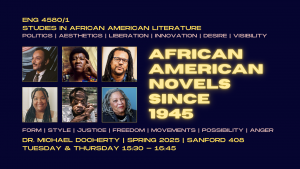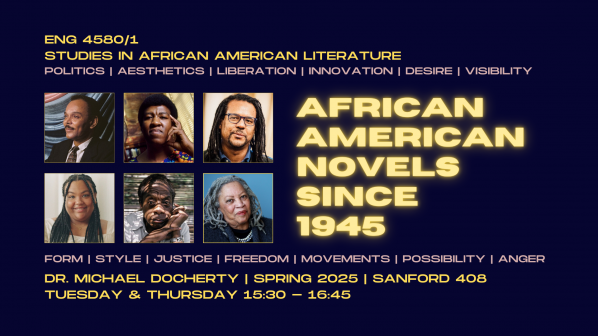ENG 4580: African American Novels Since 1945
- Dr. Michael Docherty
- Tuesday & Thursday, 3:30 - 4:45
Since the publication of William Wells Brown’s Clotel in 1853, African Americans have been exploring and expanding the possibilities of the novel as a cultural form – using it as a vehicle for political protest, social comment, aesthetic experiment, autobiographical reflection, biting satire, thrilling entertainment, and more. In the twentieth century, as African Americans gradually gained more access to the infrastructures of publishing, novels by Black writers, depicting Black communities, experiences, and culture, became more numerous – but it was only after World War II that African American novelists began to be accepted (by white critics, publishers, professors, and consumers) into the literary “canon.” Today, authors like Toni Morrison and Colson Whitehead are some of the best-known American writers. Simultaneously, though, Black novelists continue to express frustration at being restricted to a literary subcategory, segregated from the (still implicitly white) “mainstream” of American literature.
This course follows the bumpy road that the African American novel has traveled towards a central position in the landscape of American literature – and the resistance it has faced along the way. We will ask what it means (for better and for worse) for a minoritized literature to become “accepted” by a historically white-dominated literary culture. We’ll accomplish this by discussing remarkable novels by Morrison, Whitehead, Octavia Butler, Ralph Ellison, Chester Himes, James Baldwin, and Leila Mottley – staying mindful of the problems inherent in using “African American literature” as a categorizing label to group such wildly different texts and authors. These works of fiction, which span the period from 1945 to 2022, will also let us chart changing discourses around race and racism in the tumultuous decades since World War II – a period in which legal doctrines around and cultural attitudes to race in America have changed immeasurably but racism has remained a stubbornly powerful force in the life of the nation.
Indicative reading
- Chester Himes, If He Hollers Let Him Go (1945)
- Ralph Ellison, Invisible Man (1952)
- James Baldwin, Another Country (1962)
- Toni Morrison, Song of Solomon (1977)
- Octavia Butler, Parable of the Sower (1993)
- Colson Whitehead, The Underground Railroad (2016)
- Leila Mottley, Nightcrawling (2022)

